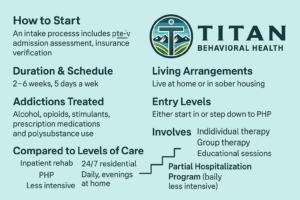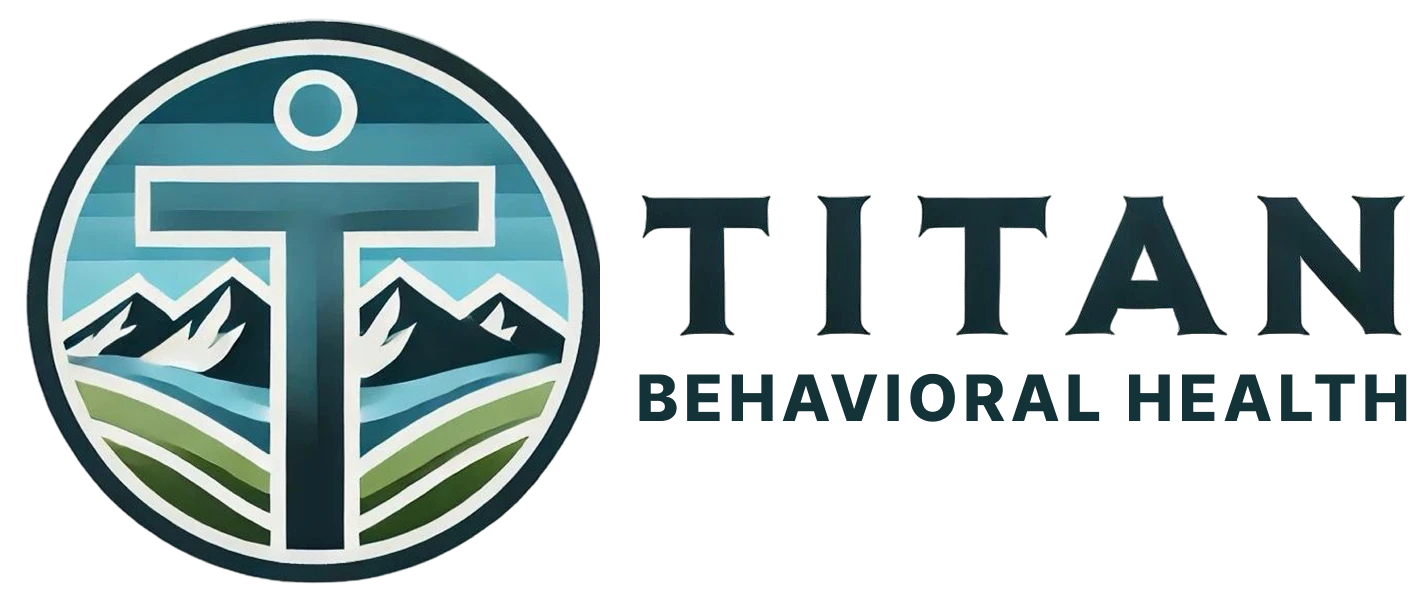Saying “yes” to treatment can feel like you’re stepping onto an airplane without knowing the destination. You know staying where you are isn’t an option, but you’re not sure what the trip will be like—or if you’ll be able to handle it.
A Partial Hospitalization Program (PHP) can be a powerful choice for people who need daily treatment but don’t require 24/7 residential care. If you’ve never been in a program like this, it’s natural to have questions. Below, we’ll walk through the most common ones, so you can enter with clarity instead of uncertainty.
How Do I Get Started in a PHP?
Starting a PHP usually begins with a phone call or an online inquiry. From there, an admissions specialist will walk you through an intake process. This often includes:
- Initial conversation to understand your needs and history.
- Pre-admission assessment (in person or over the phone) to make sure PHP is the right level of care.
- Insurance verification so you know what’s covered and what’s not.
- Medical clearance, if needed, to confirm you’re stable enough for daytime-only treatment.
If you’re in Las Vegas or nearby communities like Henderson or North Las Vegas, admissions can often be arranged quickly—sometimes within days.
How Long Does a Partial Hospitalization Program Last?
PHPs are typically structured to run for 2 to 6 weeks, but the actual length depends on your progress, stability, and ongoing needs.
Most programs operate 5 days a week, for about 4–6 hours a day. The schedule is intensive, but the goal is to give you enough daily support to stabilize while also preparing you for life outside the program.
What Addictions Are Treated in a PHP?
PHPs address a wide range of substance use disorders, including:
- Alcohol use disorder
- Opioid addiction (heroin, fentanyl, prescription painkillers)
- Stimulant addiction (methamphetamine, cocaine, prescription stimulants)
- Prescription medication misuse (benzodiazepines, sedatives)
- Polysubstance use (using multiple substances at the same time)
Most PHPs, including Titan Behavioral Health’s, are also equipped to treat co-occurring mental health conditions such as anxiety, depression, or PTSD. Addressing both substance use and mental health together can make recovery more stable.
Where Do I Live During PHP?
During PHP, you live at home or in a sober living environment and attend treatment during the day. This allows you to:
- Keep some independence while still receiving structured support.
- Practice coping skills in real-life situations after sessions.
- Build a recovery routine that works in your actual living environment.
This setup can make the transition from treatment to daily life smoother, since you’re already integrating your new skills at home each night.

Do I Have to Step Down to PHP, or Can I Start There?
You don’t have to “earn” your way into PHP. While many people step down from inpatient rehab or detox into PHP, you can start there if it’s clinically appropriate.
If you’re medically stable, able to manage your evenings at home, and motivated for daily therapy, PHP can be your first stop. If you still need medical detox, your team will help you complete that first and then move into PHP quickly.
What’s a Typical Day in PHP Like?
Every program is unique, but a day in PHP might look like this:
- Morning check-in: Share how you’re feeling and set intentions for the day.
- Group therapy: Discuss recovery challenges, coping skills, and relapse prevention strategies.
- Individual therapy: Dive into personal concerns, triggers, and goals with your therapist.
- Educational sessions: Learn about addiction science, healthy relationships, and emotional regulation.
- Skill-building activities: Practice mindfulness, communication skills, or creative expression.
- End-of-day wrap-up: Reflect on what you’ve learned and prepare for the evening.
The consistent schedule creates a rhythm that can be grounding in early recovery.
How Is PHP Different from Inpatient or IOP?
Think of levels of care like a ladder:
- Inpatient rehab is the highest rung—24/7 care in a residential setting.
- Partial Hospitalization Program is the middle rung—daily, intensive treatment with evenings at home.
- Intensive Outpatient Program (IOP) is the next rung down—fewer hours per week, more flexibility.
| Feature | Inpatient Rehab | PHP | IOP |
|---|---|---|---|
| Living Arrangements | Live at facility | Home at night | Home at night |
| Hours/Week | 24/7 | ~20–30 | ~9–12 |
| Best For | Crisis, detox, unstable conditions | Daily structure, step-down from inpatient, high support needs | Transition to weekly therapy |
Will I Be Around People Who Understand?
Yes. One of the most powerful parts of PHP is the peer connection. You’ll meet others who are also navigating recovery—some just starting, others further along. This creates a mix of shared empathy and inspiration.
“I thought I’d feel out of place, but I wasn’t. Everyone there understood what it’s like to start over—and that made it easier to keep showing up.” – Former PHP Client, 2023
Is PHP Covered by Insurance?
Many insurance plans cover PHP, especially when it’s recommended as medically necessary. The admissions team at Titan Behavioral Health can verify your benefits and explain any costs before you start, so there are no surprises.
What Happens After PHP?
When you finish PHP, you’ll typically move to a lower level of care, like IOP or standard outpatient therapy. Your care team will create a discharge plan to help you keep building on the progress you’ve made.
FAQs About Partial Hospitalization Programs
Can I work or go to school during PHP?
Because PHP is a daytime program, working full-time or attending school can be difficult. Some people adjust their schedules or take a leave during treatment.
Do I need to be sober before starting PHP?
You’ll need to be medically stable. If you’re actively using, detox may be recommended before starting PHP.
Can PHP help with cravings?
Yes. You’ll learn relapse prevention skills, and some programs offer medication-assisted treatment for cravings.
What if I miss a day?
Consistency is key in PHP. If you have to miss a day, your care team will help you catch up, but regular attendance is important for progress.
Do I have to share in group therapy?
You’re encouraged to participate, but no one will force you to share more than you’re ready for.
Finding a PHP in Las Vegas
Whether you’re stepping down from inpatient care or starting PHP as your first treatment, it’s important to find a program that meets your needs. Titan Behavioral Health offers Partial Hospitalization Program services in Las Vegas and surrounding communities like Henderson and North Las Vegas.
We focus on building a treatment plan that feels doable, sustainable, and personal—because no two recovery journeys are the same.
Ready to Take the Next Step?
Call (888) 976-8457 or visit Partial Hospitalization Program services in Las Vegas, Nevada to learn more. You don’t have to figure this out alone—our team can walk you through each step, starting today.

